 W
WThe presidency of Barack Obama began at noon EST on January 20, 2009, when Barack Obama was inaugurated as the 44th President of the United States, and ended on January 20, 2017. Obama, a Democrat from Illinois, took office following a decisive victory over Republican nominee John McCain in the 2008 presidential election. Four years later, in the 2012 election, he defeated Republican Mitt Romney to win re-election. He was the first African American president, the first multiracial president, the first non-white president, and the first president to have been born in Hawaii. Obama was succeeded by Republican Donald Trump, who won the 2016 presidential election.
 W
WFrom the mid-1980s to September 2003, the inflation-adjusted price of a barrel of crude oil on NYMEX was generally under US$25/barrel. During 2003, the price rose above $30, reached $60 by 11 August 2005, and peaked at $147.30 in July 2008. Commentators attributed these price increases to many factors, including Middle East tension, soaring demand from China, the falling value of the U.S. dollar, reports showing a decline in petroleum reserves, worries over peak oil, and financial speculation.
 W
WThe 2009 Nobel Peace Prize was awarded to United States President Barack Obama for his "extraordinary efforts to strengthen international diplomacy and cooperation between people". The Norwegian Nobel Committee announced the award on October 9, 2009, citing Obama's promotion of nuclear nonproliferation and a "new climate" in international relations fostered by Obama, especially in reaching out to the Muslim world.
 W
WThe 2010 State of the Union Address was given by the 44th President of the United States, Barack Obama, on Wednesday, January 27, 2010, at 9 p.m. EST, in the chamber of the United States House of Representatives to the 111th United States Congress. It was Obama's first State of the Union Address and his second speech to a joint session of the United States Congress. Presiding over this joint session was the House Speaker, Nancy Pelosi, accompanied by Joe Biden, the Vice President of the United States.
 W
WThe 2011 State of the Union Address was given by the 44th President of the United States, Barack Obama, on Tuesday, January 25, 2011, at 9 p.m. EST, in the chamber of the United States House of Representatives to the 112th United States Congress. It was Obama's second State of the Union Address and his third speech to a joint session of the United States Congress. Presiding over this joint session was the House Speaker, John Boehner, accompanied by Joe Biden, the Vice President of the United States.
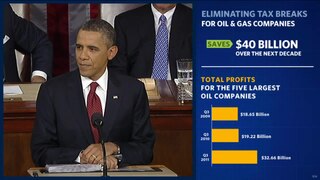 W
WThe 2012 State of the Union Address was given by the 44th President of the United States, Barack Obama, on Tuesday, January 24, 2012, at 9 p.m. EST, in the chamber of the United States House of Representatives to the 112th United States Congress. It was Obama's third State of the Union Address and his fourth speech to a joint session of the United States Congress. Presiding over this joint session was the House Speaker, John Boehner, accompanied by Joe Biden, the Vice President of the United States.
 W
WThe 2013 State of the Union Address was given by the 44th President of the United States, Barack Obama, on Tuesday, February 12, 2013, at 9 p.m. EST, in the chamber of the United States House of Representatives to the 113th United States Congress. It was Obama's fourth State of the Union Address and his fifth speech to a joint session of the United States Congress. Presiding over this joint session was the House Speaker, John Boehner, accompanied by Joe Biden, the Vice President of the United States.
 W
WFrom October 1 to October 17, 2013, the United States federal government entered a shutdown and curtailed most routine operations because neither legislation appropriating funds for fiscal year 2014 nor a continuing resolution for the interim authorization of appropriations for fiscal year 2014 was enacted in time. Regular government operations resumed October 17 after an interim appropriations bill was signed into law.
 W
WThe 2014 American immigration crisis was a surge in unaccompanied children and women from the Northern Triangle of Central America (NTCA) seeking entrance to the United States in 2014. According to U.S. law, an unaccompanied alien child refers to a person under 18 years of age, who has no lawful immigration status in the U.S., and who does not have a legal guardian to provide physical custody and care.
 W
WThe 2014 State of the Union Address was given by the 44th President of the United States, Barack Obama, on Tuesday, January 28, 2014, at 9 p.m. EST, in the chamber of the United States House of Representatives to the 113th United States Congress. It was Obama's fifth State of the Union Address and his sixth speech to a joint session of the United States Congress. Presiding over this joint session was the House Speaker, John Boehner, accompanied by Joe Biden, the Vice President of the United States.
 W
WThe 2015 State of the Union Address was given by the 44th President of the United States, Barack Obama, on Tuesday, January 20, 2015, at 9 p.m. EST, in the chamber of the United States House of Representatives to the 114th United States Congress. It was Obama's sixth State of the Union Address and his seventh speech to a joint session of the United States Congress. Presiding over this joint session was the House Speaker, John Boehner, accompanied by Joe Biden, the Vice President of the United States.
 W
WThe 2015 United States federal budget was the federal budget for fiscal year 2015, which runs from October 1, 2014 to September 30, 2015. The budget takes the form of a budget resolution which must be agreed to by both the United States House of Representatives and the United States Senate in order to become final, but never receives the signature or veto of the President of the United States and does not become law. Until both the House and the Senate pass the same concurrent resolution, no final budget exists. Actual U.S. federal government spending will occur through later appropriations legislation that would be signed into law.
 W
WThe 2016 State of the Union Address was given by the 44th President of the United States, Barack Obama, on Tuesday, January 12, 2016, at 9 p.m. EST, in the chamber of the United States House of Representatives to the 114th United States Congress. It was Obama's seventh and final State of the Union Address and his eighth and final speech to a joint session of the United States Congress. Presiding over this joint session was the House Speaker, Paul Ryan, accompanied by Joe Biden, the Vice President of the United States.
 W
WThe American Taxpayer Relief Act of 2012 was passed by the United States Congress on January 1, 2013, and was signed into law by US President Barack Obama the next day.
 W
WDuring Barack Obama's campaign for president in 2008, throughout his presidency, and afterwards, "there was extensive news coverage of Obama's religious preference, birthplace, and of the individuals questioning his religious belief and citizenship—efforts eventually known as the 'birther movement'", by which name it is widely referred to across media. The movement falsely asserted Obama was ineligible to be President of the United States because he was not a natural-born citizen of the U.S. as required by Article Two of the Constitution. Birther conspiracy theories were predominantly held by conservatives and Republicans, as well as individuals with anti-Black attitudes.
 W
WUnited States President Barack Obama discussed his plan for health care reform in a speech delivered to a joint session of the 111th United States Congress on September 9, 2009 at 8:00 PM (EDT). The speech was delivered to Congress on the floor of the chamber of the United States House of Representatives in the United States Capitol. House Speaker Nancy Pelosi presided over the joint session and was accompanied by the President of the United States Senate, Joe Biden, the Vice President of the United States. Energy Secretary Steven Chu was chosen as the designated survivor and did not attend the speech.
 W
WThe Bipartisan Budget Act of 2013 is a federal statute concerning spending and the budget in the United States, that was signed into law by President Barack Obama on December 26, 2013. On December 10, 2013, pursuant to the provisions of the Continuing Appropriations Act, 2014 calling for a joint budget conference to work on possible compromises, Representative Paul Ryan and Senator Patty Murray announced a compromise that they had agreed to after extended discussions between them. The law raises the sequestration caps for fiscal years 2014 and 2015, in return for extending the imposition of the caps into 2022 and 2023, and miscellaneous savings elsewhere in the budget. Overall, the bill is projected to lower the deficit by $23 billion over the long term.
 W
WThe Budget Control Act of 2011 is a federal statute enacted by the 112th United States Congress and signed into law by US President Barack Obama on August 2, 2011. The Act brought conclusion to the 2011 US debt-ceiling crisis.
 W
WCitizen's Briefing Book is a compilation book of recommendations made to President Barack Obama by visitors to the Change.gov website, given to the President after his January 20, 2009 inauguration. Internet users were able to post recommendations of changes they would like to see made in the United States, and they were also able to vote on other users' recommendations, as well as participate in a comment process.
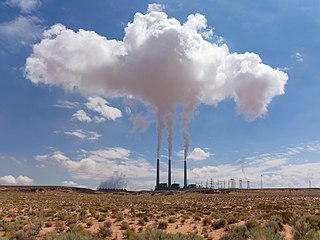 W
WThe Clean Power Plan was an Obama administration policy aimed at combating anthropogenic climate change that was first proposed by the Environmental Protection Agency (EPA) in June 2014. The final version of the plan was unveiled by President Obama on August 3, 2015. Each state was assigned an individual goal for reducing carbon emissions, which could be accomplished how they saw fit, but with the possibility of the EPA stepping in if the state refused to submit a plan. If every state met its target, the plan was projected to reduce carbon emissions from electricity generation 32% by 2030, relative to 2005 levels, as well as achieving various health benefits due to reduced air pollution.
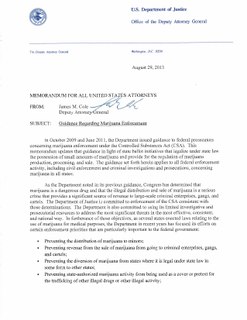 W
WThe Cole Memorandum was a United States Department of Justice memorandum issued August 29, 2013, by United States Deputy Attorney General James M. Cole during the presidency of Barack Obama. The memorandum, sent to all United States Attorneys, governed federal prosecution of offenses related to marijuana. The memo stated that given its limited resources, the Justice Department would not enforce federal marijuana prohibition in states that "legalized marijuana in some form and ... implemented strong and effective regulatory and enforcement systems to control the cultivation, distribution, sale, and possession of marijuana," except where a lack of federal enforcement would undermine federal priorities.
 W
WThe President of the United States has the authority to nominate members of the cabinet to the United States Senate for confirmation under Article II, Section II, Clause II of the United States Constitution.
 W
WThe Dodd–Frank Wall Street Reform and Consumer Protection Act is a United States federal law that was enacted on July 21, 2010. The law overhauled financial regulation in the aftermath of the Great Recession, and it made changes affecting all federal financial regulatory agencies and almost every part of the nation's financial services industry.
 W
WThe Don't Ask, Don't Tell Repeal Act of 2010 is a landmark United States federal statute enacted in December 2010 that established a process for ending the Don't ask, don't tell (DADT) policy, thus allowing gay, lesbian, and bisexual people to serve openly in the United States Armed Forces. It ended the policy in place since 1993 that allowed them to serve only if they kept their sexual orientation secret and the military did not learn of their sexual orientation, which was controversial.
 W
WPatrick R. Donahoe was the 73rd United States Postmaster General, having been appointed to the post on October 25, 2010. A 35-year veteran of the Postal Service, he reported to the Postal Service Board of Governors.
 W
WDuty: Memoirs of a Secretary at War is a nonfiction book written by Robert M. Gates, a former U.S. Secretary of Defense. It was published in January 2014 by Alfred A. Knopf. The time period is from 2006 to 2011, and includes the George W. Bush administration (2006–2009), the Obama administration (2009–2011), the Afghan war, and the Iraq War.
 W
WThe Edward M. Kennedy Serve America Act or Serve America Act was introduced in the United States House of Representatives on March 9, 2009, by Representative Carolyn McCarthy of New York. Originally titled the Generations Invigorating Volunteerism and Education Act, the bill reauthorizes and expands the AmeriCorps program that was first established in 1993. It passed in the House of Representatives on March 18, 2009. The U.S. Senate debated and approved an amended version of the bill on March 26, 2009, renaming it the Edward M. Kennedy Serve America Act, after Senator Ted Kennedy. The House of Representatives voted on the bill a second time, approving the amended version on March 31, 2009. It was signed by President Barack Obama on April 21, 2009.
 W
WThe 44th President of the United States, Barack Obama, gave his first public address before a joint session of the United States Congress on Tuesday, February 24, 2009. Similar to a State of the Union Address, it was delivered before the 111th United States Congress in the Chamber of the United States House of Representatives in the United States Capitol. Presiding over this joint session was the House Speaker, Nancy Pelosi, accompanied by Joe Biden, the Vice President of the United States.
 W
WThe Final Year is a 2017 American documentary film directed by Greg Barker. The film is a chronicle of the Barack Obama administration's foreign policy team and the events of Obama's final year in office. While President Obama features at certain points, the documentary crew mainly followed the activities of Secretary of State John Kerry, UN Ambassador Samantha Power, National Security Advisor Susan Rice and Deputy National Security Advisor Ben Rhodes. Although the documentary does not feature Donald Trump, the emphasis among the main players switches as the final year progresses from enacting a foreign policy legacy to taking measures to protect that legacy from being dismantled by the incoming administration.
 W
WThe financial crisis of 2007–2008, also known as the global financial crisis (GFC), was a severe worldwide financial crisis. Excessive risk-taking by banks combined with the bursting of the United States housing bubble caused the values of securities tied to U.S. real estate to plummet, damaging financial institutions globally, culminating with the bankruptcy of Lehman Brothers on September 15, 2008, and an international banking crisis. The crisis sparked the Great Recession, which, at the time, was the most severe global recession since the Great Depression. It was also followed by the European debt crisis, which began with a deficit in Greece in late 2009, and the 2008–2011 Icelandic financial crisis, which involved the bank failure of all three of the major banks in Iceland and, relative to the size of its economy, was the largest economic collapse suffered by any country in economic history.
 W
WThe first 100 days of Barack Obama's presidency began on January 20, 2009, the day Barack Obama was inaugurated as the 44th President of the United States. The first 100 days of a presidential term took on symbolic significance during Franklin D. Roosevelt's first term in office, and the period is considered a benchmark to measure the early success of a president. The 100th day of his presidency was April 29, 2009. Obama stated that he should not be judged just by his first hundred days: "The first hundred days is going to be important, but it’s probably going to be the first thousand days that makes the difference."
 W
WThe first inauguration of Barack Obama as the 44th President of the United States took place on Tuesday, January 20, 2009, at the West Front of the United States Capitol in Washington, D.C. The 56th inauguration, which set a record attendance for any event held in the city, marked the commencement of the first term of Barack Obama as President and Joe Biden as Vice President. Based on combined attendance numbers, television viewership, and Internet traffic, it was one of the most-observed events ever by the global audience.
 W
WThe Fraud Enforcement and Recovery Act of 2009, or FERA, Pub.L. 111–21, S. 386, 123 Stat. 1617, enacted May 20, 2009, is a public law in the United States enacted in 2009. The law enhanced criminal enforcement of federal fraud laws, especially regarding financial institutions, mortgage fraud, and securities fraud or commodities fraud.
 W
WFollowing is a comprehensive list of all Article III and Article IV United States federal judges appointed by President Barack Obama during his presidency, as well as a partial list of Article I federal judicial appointments, excluding appointments to the District of Columbia judiciary.
 W
WOn May 10, 2010, President Barack Obama announced his selection of Elena Kagan for Associate Justice of the Supreme Court of the United States, to replace retiring Justice John Paul Stevens. Kagan's nomination was confirmed by a 63–37 vote of the United States Senate on August 5, 2010. When nominated, Kagan was Solicitor General of the United States, a position to which Obama had appointed her in March 2009.
 W
WThe Leahy–Smith America Invents Act (AIA) is a United States federal statute that was passed by Congress and was signed into law by President Barack Obama on September 16, 2011. The law represents the most significant legislative change to the U.S. patent system since the Patent Act of 1952 and closely resembles previously proposed legislation in the Senate in its previous session.
 W
WThe Lilly Ledbetter Fair Pay Act of 2009 is a federal statute in the United States that was the first bill signed into law by US President Barack Obama on January 29, 2009. The act amends Title VII of the Civil Rights Act of 1964 and states that the 180-day statute of limitations for filing an equal-pay lawsuit regarding pay discrimination resets with each new paycheck affected by that discriminatory action. The law directly addressed Ledbetter v. Goodyear Tire & Rubber Co. (2007), a U.S. Supreme Court decision that the statute of limitations for presenting an equal-pay lawsuit begins on the date that the employer makes the initial discriminatory wage decision, not at the date of the most recent paycheck.
 W
WThe Matthew Shepard and James Byrd Jr. Hate Crimes Prevention Act is an American Act of Congress, passed on October 22, 2009, and signed into law by President Barack Obama on October 28, 2009, as a rider to the National Defense Authorization Act for 2010. Conceived as a response to the murders of Matthew Shepard and James Byrd Jr., both in 1998, the measure expands the 1969 United States federal hate-crime law to include crimes motivated by a victim's actual or perceived gender, sexual orientation, gender identity, or disability.
 W
WMedicare Access and CHIP Reauthorization Act of 2015 (MACRA), commonly called the Permanent Doc Fix, is a United States statute. It changes the payment system for doctors who treat Medicare patients. It revises the Balanced Budget Act of 1997. It was the largest scale change to the American health care system following the Affordable Care Act in 2010.
 W
WOn March 16, 2016, President Barack Obama nominated Merrick Garland for Associate Justice of the Supreme Court of the United States to succeed Antonin Scalia, who had died one month earlier. At the time of his nomination, Garland was the Chief Judge of the United States Court of Appeals for the District of Columbia Circuit.
 W
WThe creation of a National Infrastructure Reinvestment Bank was first proposed by United States Senator Christopher J. Dodd and Senator Chuck Hagel in 2007. However, several other iterations of a National Infrastructure Bank have been proposed and considered and it is likely that implementing legislation for the Bank will look quite different from that which was proposed in the original legislation.
 W
WNew Democrats, also known as centrist Democrats, Clinton Democrats, or moderate Democrats, are a centrist ideological faction within the Democratic Party in the United States. As the Third Way faction of the party, they support cultural liberalism but take moderate or fiscal conservative stances. New Democrats dominated the party from the late-1980s through the mid-2010s when progressives began to hold greater influence, although the faction still holds a plurality.
 W
WThe Nuclear Security Summit (NSS) is a world summit, aimed at preventing nuclear terrorism around the globe. The first summit was held in Washington, D.C., United States, on April 12–13, 2010. The second summit was held in Seoul, South Korea, in 2012. The third summit was held in The Hague, Netherlands, on March 24–25, 2014. The fourth summit was held in Washington, D.C. on March 31–April 1, 2016
 W
WThe Affordable Care Act (ACA), formally known as the Patient Protection and Affordable Care Act, and commonly known as Obamacare, is a United States federal statute enacted by the 111th United States Congress and signed into law by President Barack Obama on March 23, 2010. Together with the Health Care and Education Reconciliation Act of 2010 amendment, it represents the U.S. healthcare system's most significant regulatory overhaul and expansion of coverage since the passage of Medicare and Medicaid in 1965.
 W
WThe presidential transition of Barack Obama began when Barack Obama won the United States presidential election on November 4, 2008, and became the President-elect. Obama was formally elected by the Electoral College on December 15, 2008. The results were certified by a joint session of Congress on January 8, 2009, and the transition ended when Obama was inaugurated at noon EST on January 20, 2009.
 W
WOn April 15, 2013, an envelope that preliminarily tested positive for ricin, a highly toxic protein, was intercepted at the US Capitol's off-site mail facility in Washington, D.C. According to reports, the envelope was addressed to the office of Mississippi Republican Senator Roger Wicker. On April 17, 2013, an envelope addressed to President of the United States Barack Obama preliminarily tested positive for ricin.
 W
WHillary Clinton served as the 67th United States Secretary of State, under President Barack Obama, from 2009 to 2013, overseeing the department that conducted the foreign policy of Barack Obama.
 W
WBarack Obama, who was the 44th President of the United States, was involved in multiple security incidents, including several assassination threats and plots, starting from when he became a presidential candidate in 2007. Secret Service protection for Obama began after he received a death threat in 2007, while serving as the junior United States senator from Illinois and running for president. This marked the earliest time a candidate received such protection before being nominated. Security was increased early for Obama due to fears of possible assassination attempts by white supremacist or other racist groups or individuals against the first African American major party presidential nominee.
 W
WOn May 26, 2009, President Barack Obama announced his selection of Judge Sonia Sotomayor for Associate Justice of the Supreme Court of the United States, to replace retiring Justice David Souter. Sotomayor's nomination was submitted to the United States Senate on June 1, 2009, when the 111th Congress reconvened after its Memorial Day recess. Sotomayor was confirmed by the U.S. Senate on August 6, 2009 by a 68–31 vote and was commissioned by President Obama the same day. She was sworn in by Chief Justice John Roberts on August 8, 2009.
 W
WThe Securing the Protection of our Enduring and Established Constitutional Heritage (SPEECH) Act is a 2010 federal statutory law in the United States that makes foreign libel judgments unenforceable in U.S. courts, unless either the foreign legislation applied offers at least as much protection as the U.S. First Amendment, or the defendant would have been found liable even if the case had been heard under U.S. law.
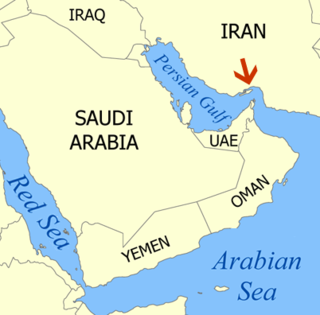 W
WThe Strait of Hormuz dispute is an ongoing dispute between a coalition of countries and Iran. The dispute arose on 27 December 2011, when Iranian Vice President Mohammad-Reza Rahimi threatened to close the Strait of Hormuz. In late April 2019 Iran said that it will block any shipping if it was barred from using the strategic waterway and in face of US sanctions
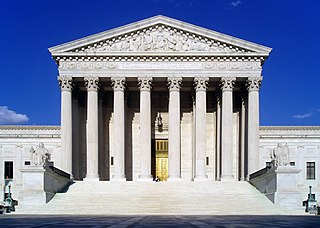 W
WPresident Barack Obama made two successful appointments to the Supreme Court of the United States. The first was Judge Sonia Sotomayor to fill the vacancy created by the retirement of Justice David H. Souter. Sotomayor was confirmed by the United States Senate on August 6, 2009, by a vote of 68–31. The second appointment was that of Solicitor General Elena Kagan to replace the retired John Paul Stevens. Kagan was confirmed by the United States Senate on August 5, 2010, by a vote of 63–37.
 W
WThe Tax Relief, Unemployment Insurance Reauthorization, and Job Creation Act of 2010, also known as the 2010 Tax Relief Act, was passed by the United States Congress on December 16, 2010, and signed into law by President Barack Obama on December 17, 2010.
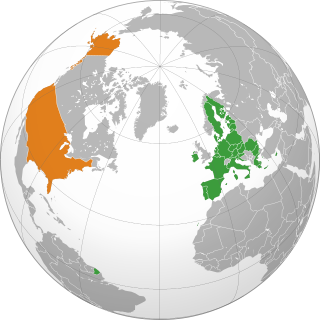 W
WThe Transatlantic Trade and Investment Partnership (TTIP) is a proposed trade agreement between the European Union and the United States, with the aim of promoting trade and multilateral economic growth. According to Karel de Gucht, European Commissioner for Trade between 2010 and 2014, the TTIP is the largest bilateral trade initiative ever negotiated, not only because it involves the two largest economies in the world but also "because of its potential global reach in setting an example for future partners and agreements".
 W
WBetter Utilizing Investments to Leverage Development (BUILD), previously called Transportation Investment Generating Economic Recovery (TIGER), is a supplementary discretionary grant program included in the American Recovery and Reinvestment Act of 2009. The legislation provided $1.5 billion for a National Surface Transportation System through September 30, 2011, "to be awarded on a competitive basis for capital investments in surface transportation projects".
 W
WThe White House Hanukkah Party is an annual reception held at the White House and hosted by the U.S. President and First Lady to recognize and celebrate the Jewish festival of Hanukkah. The tradition was established in 2001, during the administration of George W. Bush. The guest list includes hundreds of American Jewish politicians, organization heads, and school and yeshiva deans.
 W
WThe 2014 White House intrusion occurred on September 19, 2014, when Omar J. Gonzalez, an Iraq War veteran with post-traumatic stress disorder, jumped over the White House's fence and entered the building's front door, overpowered one security officer, was stopped by another who was off-duty, then later by multiple security officers, and arrested. He was found to have a small knife in his pocket, and stated that the "atmosphere was collapsing" and he needed to tell the president so that he could alert the public. President Barack Obama and his family were not home at the time of the incident. As a result of this incident and other security breaches at the White House, the then-director of the United States Secret Service, Julia Pierson, resigned from her position on October 1, 2014.
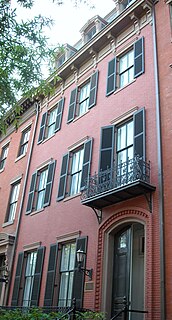 W
WThe White House Office of Faith-Based and Neighborhood Partnerships, formerly the White House Office of Faith-Based and Community Initiatives (OFBCI) is an office within the White House Office that is part of the Executive Office of the President of the United States.
 W
WThe White House Passover Seder was an annual private dinner held at the White House on the Jewish holiday of Passover during the presidency of Barack Obama. Obama initiated it in 2009 for his family, staff members, friends, and their families. The gathering recited the Passover Haggadah, discussed the themes of the Passover Seder and their relation to current events, and partook of a holiday-themed meal. Obama hosted and attended the Seder each year from 2009 to 2016. It was the first Passover Seder to be conducted by a sitting U.S. president in the White House.
 W
WThe 2011 White House shooting occurred on November 11, 2011, when Oscar Ramiro Ortega-Hernandez, an unemployed 21-year-old man, fired a semi-automatic rifle at the White House, the official residence of the U.S. President in Washington, D.C. At least seven bullets hit the second floor. Neither the president nor First Lady Michelle Obama were home at the time, although their youngest daughter, Sasha, and the first lady's mother, Marian Shields Robinson, were. No one was injured. It took four days for the Secret Service to realize that bullets had struck the White House. Michelle Obama learned of the shooting from an usher, then summoned Mark J. Sullivan, director of the Secret Service, to find out why the first family had not been informed.